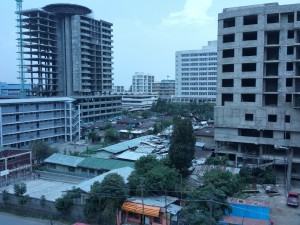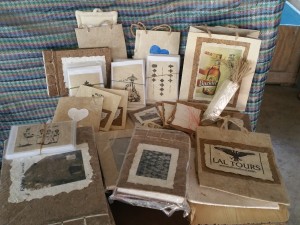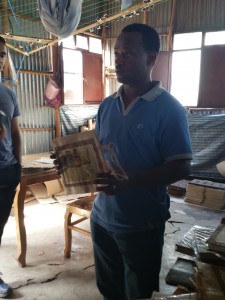
Ethiopia is the only African country that has never been colonized, a fact the people are extremely proud of, and rightly so. Walk down the street and you will not see ONE foreign owned enterprise or big box retailer. That means no Walmart, no Target, no Forever 21, no McDonalds, and no, not even a Starbucks, even though Ethiopia’s own “Kaldi’s” is the copycat version. Other than the large banks, almost every business is either government owned or family owned.
Indeed, it is painful to imagine foreign retailers pasting a templated store into the heart of Addis. Businesses having success in Kenya or South Africa often do not have a market here.
In almost every market, the barriers to entry are low but there is little support and business infrastructure to be found. Therefore, every business is under funded and is heavily hindered from being scalable. The pain points are clear. Talk to any business owner, manager, CEO, or entrepreneur in Addis and they will tell you the same thing –
1. Rent
2. Financing
The shortage of not only money, but also capital available in Ethiopia is astounding. Due to government regulations capping foreign investment in most sectors, Ethiopia has one the lowest amounts of credit available in the private sector in the region – about 14%. However, generous government subsidies are available to certain businesses, often covering cost of materials and even rent.
The biggest hindrance to private sector development and innovation is a “government blessing”. In most cases, success largely depends on government policy. For example, if a company wanted to import raw materials not produced in Ethiopia, regulations state that it MUST also export Ethiopian produced goods in amounts equal to or greater than the value of the imported goods.
And a lot of things are not made in Ethiopia. For example, medical devices such as syringes, urine or stool cups, and surgical masks. An entrepreneur named Abeba has secured a government grant, government demand and highly subsidized land to be the sole producer and manufacturer of these products in Addis Ababa.
Some are getting restless. They see the homogenous and low quality products and services that are being distributed in Addis and know there is a huge gap between what could be offered and what actually is. Currently the government owns all telecom, electricity, water, utilities, and heavily restricts banking, transport, and retail sectors. It refuses invitations to join the WTO each year and will continue to.
But, it seems the government will change its mind for good reasons. Mr. Fitsum Gezahegn, is the owner of Paradise Ethiopia Travel and an Arc graduate. Under his suggestion, the government formed the Ethiopian Board of Tourism, resulting in tourism becoming a private / public sector. The government now funds only 40% of the industry, allowing for greater expansion opportunities from private parties. Fitsum is now Ethiopia’s international tourism representative.
Speaking of tourism, depending on who you ask, customer service is either “everything”, or “not a thing”. During our workshop, we asked the question, “What do your customers want?” – and each entrepreneur had the same answer: High quality and customization. Business is so humble here that products and services are customized by the nature of the start-up (clothing design, honey wine production, security, landscaping services). Almost all small businesses will be quick be use this as a point of differentiation, but it is really intrinsic of their business, a realization that was felt by many in our group.
Because of this, many grow to distrust large corporations, imported products, and even the news on TV, preferring locally made products, and information heard through friends and family. Our team was surprised when many participants wanted to start local manufacturing businesses for basic materials such as plastic bottles or juice, which would enter the market to directly compete with low cost, low price, huge volume imported goods from China. However, in Ethiopia, such “audacity” is actually feasible because there is such a demand for locally made and produced products – it is not only heavily encouraged by the government (in the form of subsidies) to boost the economy, but also by the local customers who trust locally made products rather than the chemical and questionable quality of Chinese imports.
Therefore, almost all business marketing is primarily done through word of mouth, making awareness of each again, difficult to scale. Surprisingly, TV advertisements are not taken with a grain of salt; the logic being that if a business had enough cash to advertise, they must be reputable.
Most foreign corporations have mastered ongoing customer service. However, the laissez-faire attitude of the habesha culture, despite the friendliness of most citizens, certainly infiltrates the corporate world. According to our participants, support through the buyers’ process, and especially product maintenance and upkeep is almost non existent. The looming threat of foreign corporations in Ethiopia concerns some entrepreneurs who believe the superior customer service may crowd out and replace local businesses if they cannot adapt.
Despite this, Ethiopia’s “closed door” policy has many merits. I have never seen targeted groups or people. Although the disparity between rich and poor is extreme, (a man told me last week, “There is no average. There is rich and there is very poor”). Locals are accommodating, helpful and friendly, and in some ways because of the people I feel safer in Addis than in many places I have travelled.
Although the country is split almost exactly 50/50 religiously (Christian and Muslim), the two groups live in such harmony it is difficult to believe that their brothers and sisters in faith in surrounding regions have gone to war for millennia over differing beliefs.
Bright and hopeful minds we met believe the country plans to change drastically. The pace of wealth creation is impressive for a country with an average GNI of less than $500. Surely it is a country that cannot close its doors from the world forever, and when it finally changes it policies, we might see a new and formidable player in the game.
-P


